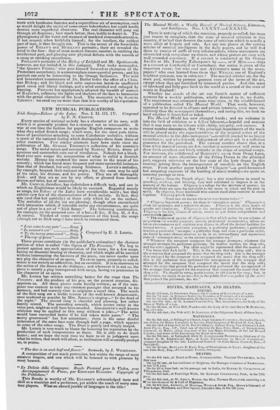NEW MUSICAL PUBLICATIONS.
Iri.sh Songs—Echoes of the Lakes. Nos. I. II. III. IV. Composed by F. N. Caoccit.
Every species of national melody has a character of its own, with which it is generally prudent for a stranger not to intermeddle.It was at one time the flishion for popular English composers to write what they called Scotch songs ; which were for the most part, imita- tions of peculiarities attaching to some Caledonian melodies, without a spark of the national feeling which distinguishes them from those of other countries. Few similar attempts have been made since the publication of Mr. GEORGE THONISON'S collection of his country's songs. The metal recast and recoined by ROBERT BURNS, drove all spurious and counterfeit coin out of circulation. Nobody but a block- head ever now essays the composition of what is called a Scottish melody. MocutE has rendered the same service to the music of his country ; which has found more frequent and more successful imitators than that of Scotland, but only among Irishmen. Lovea's melodies, for example, bespeak their national origin ; but the same may be said of his tales, his dramas, and his poetry. They are all thoroughly Irish : and they are so not by any effort, or gleaned from former dramas and tales, but of necessity. Mr. CROUCH, therefore, has undertaken a difficult task, and one in which no Englishman would be likely to succeed. Regarded merely as songs, his Echoes Qf the Lakes have considerable merit ; but they exhibit very few of the characteristics of Irish melody. In fact, they aim (and that but partially) at those only which lie on the surface. The melodies of all the set are pleasing; though often encumbered with harmonies which, if tolerable under any circumstances, are quite out of place in a set of "Irish Songs." The following combination, for example, on the accented note of a bar—E flat, B Hat, I), A flat, A natural. Weeded of some extravagances of this kind, the songs (though not as Irish songs) have much to recommend them.
"Love came to our gate" Song. "Iii summer's cot" Song. " To the merry greenwood" Song. " The cup of peace" Duet.
These pieces constitute (in the publisher's estimation) the choicest portion of what is called "the Opera of The Foresters." We beg to protest against any such appropriation of the term ; for a few songs, having no dramatic bearing or character, and which might all be omitted without interrupting the business of the piece, can never confer upon any play the character of an opera. To every opera, properly so called, music is not merely an addendum, but an essential. It is as necessary to the action of the drama as the dialogue ; and whenever it is not so, the piece is merely a play interspersed with songs, having no pretension to the character of an opera.
Mr. LODER has written something better for the stage than The Foresters, and the produce of his pen, on the present occasion, dis- appoints us. All these pieces seem hastily written ; as if the com- poser was content to take any common passages that occurred to his memory, and had scarcely time to originate a novel idea. The words of the first song are a feeble version of the well-known Anacreontic, once rendered so popular by Mrs. JORDAN'S singing—. In the dead of the night." The second song is cheerful and pleasing, but rather hastily scored. The ascending seventh, which occurs twice in the voice part, might as well have been avoided. GOLDSMITH'S well-known criticism may be applied to this song without a joke—" The artist would have succeeded better if be bad taken more pains." " The merry greenwood" has few attractions : there is the same direful reiteration of the same bass note through half a page, which appears in some of the other songs. The Duet is purely and simply insipid.
Mr. LODER is very much to blame for lowering his reputation by the production of such compositions as these. He is able to do much better ; and we hope the next time we have to sit in judonent upon what he writes, that truth will allow, as inclination will assuredly prompt us, to praise.
Composed by E. J. LODER.


























 Previous page
Previous page